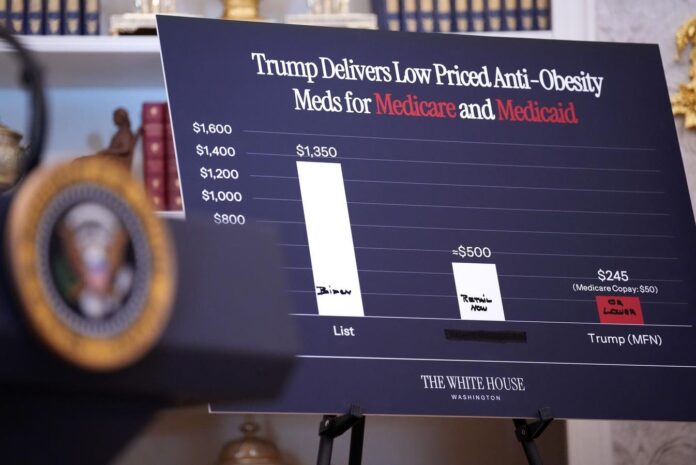President Donald Trump announced that his administration has reached agreements with drugmakers Eli Lilly and Novo Nordisk that would lower the price of some GLP-1 weight loss medications. (Photo by Andrew Harnik/Getty Images)
Getty Images
America’s healthcare system stands at a remarkable crossroads. On one side, medical innovation is transforming lives. On the other, an underground industry is profiting from deception, endangering patients in the process.
Few developments have been as revolutionary as GLP-1 medications like Ozempic, Wegovy and Mounjaro. Once limited to diabetes care, these drugs are now helping millions combat obesity—a condition affecting roughly 40% of U.S. adults. They are reshaping medicine as profoundly as antibiotics once did.
But with every genuine breakthrough comes the counterfeiters. And this time, the stakes are life and death.
A Booming Market, a Shadow Industry
In 2024 U.S. spending on prescription drugs soared past $800 billion, much of it driven by GLP-1 therapies. The surge was predictable: These medicines offer hope where diet and exercise alone have often failed. However, that same demand has drawn opportunists—both domestic and foreign—peddling fake and illegally compounded versions.
Customs officers recently seized more than 50,000 counterfeit doses at a single U.S. port. The FDA has logged hundreds of hospitalizations and more than 20 deaths linked to these knockoff drugs. These aren’t harmless fakes; they’re chemical roulette.
When Regulation Becomes a Loophole
The problem isn’t simply that counterfeit drugs exist. It’s that our own rules have created the cracks they slip through. America’s 7,500 compounding pharmacies play a valuable role in customizing treatments, but some have turned those privileges into a cover for mass-producing GLP-1 copies with unverified ingredients.
Meanwhile, legitimate companies that invest billions in safety and research are being undercut by bad actors who operate with impunity. Patients lose confidence, innovators lose incentive and the black market grows stronger.
Smart Enforcement, Not More Bureaucracy
The reflexive Washington answer is always “more regulation.” But piling on red tape won’t stop counterfeiters; it’ll only punish the good guys. What we need is smart, targeted enforcement.
Congress and the FDA should require compounders to disclose the FDA-registered source of their ingredients and block imports from unregistered suppliers. Inspections should focus on facilities linked to foreign-sourced APIs and mislabeled shipments. At the same time, enforcement must shut down “gym pharmacies” and online operators who sell fake GLP-1s by the thousands.
Leadership and Integrity
This isn’t just about one class of drugs. It’s about the credibility of American medicine and the integrity of our markets. When counterfeiters thrive, trust collapses—and so does innovation.
Washington must act decisively, but wisely. Give regulators the tools to go after the criminals, not the innovators. Strengthen the FDA’s oversight where it matters most, and let safe, legitimate producers compete on a level playing field.
The “Fauxzempic” crisis is a warning. If we don’t protect the pipeline of legitimate innovation, we’ll lose more than public health—we’ll lose faith in the very system that delivers medical miracles.
It’s time for leadership grounded in principle: firm enforcement, transparent sourcing, and respect for the power of free-market innovation. America’s patients—and its future—deserve nothing less.



